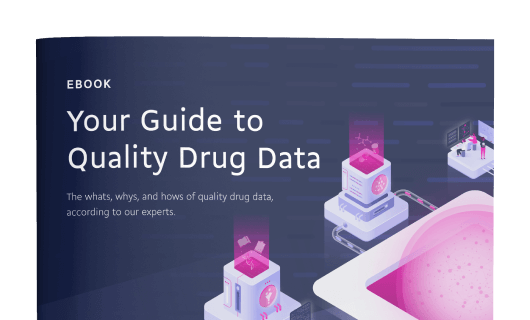Explore a selection of our essential drug information below, or:
Identification
- Summary
Lecanemab is an amyloid beta-targeting antibody used to treat Alzheimer’s Disease in patients with mild cognitive impairment or mild dementia with a known amyloid beta pathology.
- Brand Names
- Leqembi
- Generic Name
- Lecanemab
- DrugBank Accession Number
- DB14580
- Background
Lecanemab is a recombinant humanized immunoglobulin gamma 1 (IgG1) monoclonal antibody directed against aggregated soluble and insoluble forms of amyloid beta (Aβ), which are implicated in the pathophysiology of Alzheimer’s disease.7 Lecanemab works to reduce Aβ plaques and prevent Aβ deposition in the brain 1,2 with high selectivity to Aβ protofibrils.1,3 In clinical trials, it significantly reduced brain Aβ plaques compared to placebo.4,8
On January 6, 2023, lecanemab was granted accelerated approval by the FDA for the treatment of Alzheimer’s Disease.8 It was granted full FDA approval on July 6, 2023.9
- Type
- Biotech
- Groups
- Approved, Investigational
- Biologic Classification
- Protein Based Therapies
Monoclonal antibody (mAb) - Protein Chemical Formula
- C6544H10088N1744O2032S46
- Protein Average Weight
- 150000.0 Da (approximate)
- Sequences
>Lecanemab heavy chain EVQLVESGGGLVQPGGSLRLSCSASGFTFSSFGMHWVRQAPGKGLEWVAYISSGSSTIYY GDTVKGRFTISRDNAKNSLFLQMSSLRAEDTAVYYCAREGGYYYGRSYYTMDYWGQGTTV TVSSASTKGPSVFPLAPSSKSTSGGTAALGCLVKDYFPEPVTVSWNSGALTSGVHTFPAV LQSSGLYSLSSVVTVPSSSLGTQTYICNVNHKPSNTKVDKRVEPKSCDKTHTCPPCPAPE LLGGPSVFLFPPKPKDTLMISRTPEVTCVVVDVSHEDPEVKFNWYVDGVEVHNAKTKPRE EQYNSTYRVVSVLTVLHQDWLNGKEYKCKVSNKALPAPIEKTISKAKGQPREPQVYTLPP SREEMTKNQVSLTCLVKGFYPSDIAVEWESNGQPENNYKTTPPVLDSDGSFFLYSKLTVD KSRWQQGNVFSCSVMHEALHNHYTQKSLSLSPGK
>Lecanemab light chain DVVMTQSPLSLPVTPGAPASISCRSSQSIVHSNGNTYLEWYLQKPGQSPKLLIYKVSNRF SGVPDRFSGSGSGTDFTLRISRVEAEDVGIYYCFQGSHVPPTFGPGTKLEIKRTVAAPSV FIFPPSDEQLKSGTASVVCLLNNFYPREAKVQWKVDNALQSGNSQESVTEQDSKDSTYSL SSTLTLSKADYEKHKVYACEVTHQGLSSPVTKSFNRGEC
Download FASTA FormatReferences:
- KEGG DRUG: Lecanemab [Link]
- Synonyms
- Immunoglobulin G1, anti-(human beta-amyloid protofibril) (human-mus musculus monoclonal BAN2401 heavy chain), disulfide with human-mus musculus monoclonal BAN2401 light chain, dimer
- Lecanemab
- External IDs
- BAN 2401
- BAN-2401
- BAN2401
- WHO 11194
Pharmacology
- Indication
Lecanemab is indicated for the treatment of Alzheimer’s disease. Treatment with lecanemab should be initiated in patients with mild cognitive impairment or mild dementia stage of disease, the population in which treatment was initiated in clinical trials.10
 Reduce drug development failure ratesBuild, train, & validate machine-learning modelswith evidence-based and structured datasets.Build, train, & validate predictive machine-learning models with structured datasets.
Reduce drug development failure ratesBuild, train, & validate machine-learning modelswith evidence-based and structured datasets.Build, train, & validate predictive machine-learning models with structured datasets.- Associated Conditions
Indication Type Indication Combined Product Details Approval Level Age Group Patient Characteristics Dose Form Management of Alzheimer's disease (ad) •••••••••••• •••• ••••••••• •••••••••• ••••• Management of Alzheimer's disease (ad) •••••••••••• •••• •••••••• •• ••• ••••••••••• •••• - Contraindications & Blackbox Warnings
 Prevent Adverse Drug Events TodayTap into our Clinical API for life-saving information on contraindications & blackbox warnings, population restrictions, harmful risks, & more.Avoid life-threatening adverse drug events with our Clinical API
Prevent Adverse Drug Events TodayTap into our Clinical API for life-saving information on contraindications & blackbox warnings, population restrictions, harmful risks, & more.Avoid life-threatening adverse drug events with our Clinical API- Pharmacodynamics
Lecanemab reduces amyloid-β (Aβ) plaques in a dose- and time-dependent manner. In clinical trials, lecanemab also reduced plasma P-tau181.7
- Mechanism of action
Extracellular amyloid-β (Aβ) plaques are a hallmark pathology of Alzheimer's disease (AD), making them a desirable therapeutic target for potential drugs for treating AD. The production and accumulation of Aβ plaques in the brain are commonly observed in AD, and distinct characteristics of Aβ plaques - such as the solubility, quantity, and composition of Aβ pools - may affect the disease state.5,6 Aβ causes synaptic impairment, neuronal death, and progressive neurodegeneration, which leads to dementia and cognitive impairment associated with AD.5
Aβ peptides exist in various conformational states, including soluble monomers, soluble aggregates of increasing size, and insoluble fibrils and plaque. Soluble Aβ aggregates such as Aβ protofibrils are more neurotoxic than monomers or insoluble fibrils.2 Lecanemab is an antibody that lowers Aβ plaques in the brain.7 It preferentially targets soluble aggregated Aβ and works on Aβ oligomers, protofibrils, and insoluble fibrils.5
Target Actions Organism AAmyloid beta A4 protein binderHumans - Absorption
Steady-state concentrations of lecanemab were reached after six weeks when 10 mg/kg of lecanemab was administered every two weeks. Systemic accumulation was 1.4-fold. The peak concentration (Cmax) and area under the plasma concentration versus time curve (AUC) of lecanemab increased dose proportionally following a single dose ranging from 0.3 to 15 mg/kg.7
- Volume of distribution
The mean value (95% CI) for the central volume of distribution at steady-state is 3.22 (3.15-3.28) L.7
- Protein binding
There is no information available.
- Metabolism
Lecanemab is degraded by proteolytic enzymes in the same manner as endogenous IgGs.7
- Route of elimination
There is no information available.
- Half-life
The terminal half-life is 5 to 7 days.7
- Clearance
The clearance of lecanemab (95% CI) is 0.434 (0.420-0.451) L/day.7
- Adverse Effects
 Improve decision support & research outcomesWith structured adverse effects data, including: blackbox warnings, adverse reactions, warning & precautions, & incidence rates. View sample adverse effects data in our new Data Library!Improve decision support & research outcomes with our structured adverse effects data.
Improve decision support & research outcomesWith structured adverse effects data, including: blackbox warnings, adverse reactions, warning & precautions, & incidence rates. View sample adverse effects data in our new Data Library!Improve decision support & research outcomes with our structured adverse effects data.- Toxicity
There is no information available regarding the LD50 and overdose of lecanemab.
- Pathways
- Not Available
- Pharmacogenomic Effects/ADRs
- Not Available
Interactions
- Drug Interactions
- This information should not be interpreted without the help of a healthcare provider. If you believe you are experiencing an interaction, contact a healthcare provider immediately. The absence of an interaction does not necessarily mean no interactions exist.
Drug Interaction Integrate drug-drug
interactions in your softwareAbciximab The risk or severity of adverse effects can be increased when Abciximab is combined with Lecanemab. Adalimumab The risk or severity of adverse effects can be increased when Adalimumab is combined with Lecanemab. Aducanumab The risk or severity of adverse effects can be increased when Aducanumab is combined with Lecanemab. Alemtuzumab The risk or severity of adverse effects can be increased when Alemtuzumab is combined with Lecanemab. Alirocumab The risk or severity of adverse effects can be increased when Alirocumab is combined with Lecanemab. - Food Interactions
- No interactions found.
Products
 Drug product information from 10+ global regionsOur datasets provide approved product information including:dosage, form, labeller, route of administration, and marketing period.Access drug product information from over 10 global regions.
Drug product information from 10+ global regionsOur datasets provide approved product information including:dosage, form, labeller, route of administration, and marketing period.Access drug product information from over 10 global regions.- Brand Name Prescription Products
Name Dosage Strength Route Labeller Marketing Start Marketing End Region Image Leqembi Injection, solution 100 mg/1mL Intravenous Eisai Inc. 2023-01-06 Not applicable US Leqembi Injection, solution 100 mg/1mL Intravenous Eisai Inc. 2023-01-06 Not applicable US
Categories
- ATC Codes
- N06DX04 — Lecanemab
- Drug Categories
- Chemical TaxonomyProvided by Classyfire
- Description
- Not Available
- Kingdom
- Organic Compounds
- Super Class
- Organic Acids
- Class
- Carboxylic Acids and Derivatives
- Sub Class
- Amino Acids, Peptides, and Analogues
- Direct Parent
- Peptides
- Alternative Parents
- Not Available
- Substituents
- Not Available
- Molecular Framework
- Not Available
- External Descriptors
- Not Available
- Affected organisms
- Not Available
Chemical Identifiers
- UNII
- 12PYH0FTU9
- CAS number
- 1260393-98-3
References
- General References
- Logovinsky V, Satlin A, Lai R, Swanson C, Kaplow J, Osswald G, Basun H, Lannfelt L: Safety and tolerability of BAN2401--a clinical study in Alzheimer's disease with a protofibril selective Abeta antibody. Alzheimers Res Ther. 2016 Apr 6;8(1):14. doi: 10.1186/s13195-016-0181-2. [Article]
- Shi M, Chu F, Zhu F, Zhu J: Impact of Anti-amyloid-beta Monoclonal Antibodies on the Pathology and Clinical Profile of Alzheimer's Disease: A Focus on Aducanumab and Lecanemab. Front Aging Neurosci. 2022 Apr 12;14:870517. doi: 10.3389/fnagi.2022.870517. eCollection 2022. [Article]
- Cummings J, Lee G, Nahed P, Kambar MEZN, Zhong K, Fonseca J, Taghva K: Alzheimer's disease drug development pipeline: 2022. Alzheimers Dement (N Y). 2022 May 4;8(1):e12295. doi: 10.1002/trc2.12295. eCollection 2022. [Article]
- Swanson CJ, Zhang Y, Dhadda S, Wang J, Kaplow J, Lai RYK, Lannfelt L, Bradley H, Rabe M, Koyama A, Reyderman L, Berry DA, Berry S, Gordon R, Kramer LD, Cummings JL: A randomized, double-blind, phase 2b proof-of-concept clinical trial in early Alzheimer's disease with lecanemab, an anti-Abeta protofibril antibody. Alzheimers Res Ther. 2021 Apr 17;13(1):80. doi: 10.1186/s13195-021-00813-8. [Article]
- Song C, Shi J, Zhang P, Zhang Y, Xu J, Zhao L, Zhang R, Wang H, Chen H: Immunotherapy for Alzheimer's disease: targeting beta-amyloid and beyond. Transl Neurodegener. 2022 Mar 18;11(1):18. doi: 10.1186/s40035-022-00292-3. [Article]
- Murphy MP, LeVine H 3rd: Alzheimer's disease and the amyloid-beta peptide. J Alzheimers Dis. 2010;19(1):311-23. doi: 10.3233/JAD-2010-1221. [Article]
- FDA Approved Drug Products: LEQEMBI (lecanemab-irmb) injection, for intravenous use [Link]
- FDA News Release: FDA Grants Accelerated Approval for Alzheimer’s Disease Treatment [Link]
- FDA News Release: FDA Converts Novel Alzheimer’s Disease Treatment to Traditional Approval [Link]
- FDA Approved Drug Products: LEQEMBI (lecanemab-irmb) injection, for intravenous use (July 2023) [Link]
- External Links
Clinical Trials
- Clinical Trials
Clinical Trial & Rare Diseases Add-on Data Package
Explore 4,000+ rare diseases, orphan drugs & condition pairs, clinical trial why stopped data, & more. Preview package Phase Status Purpose Conditions Count Start Date Why Stopped 100+ additional columns Unlock 175K+ rows when you subscribe.View sample data3 Active Not Recruiting Treatment Coronavirus Disease 2019 (COVID‑19) / Early Alzheimers Disease 1 somestatus stop reason just information to hide 3 Recruiting Treatment Alzheimer's Disease (AD) / Dementia / Familial Alzheimer Disease (FAD) 1 somestatus stop reason just information to hide 3 Recruiting Treatment Early Preclinical Alzheimer's Disease / Preclinical Alzheimer's Disease 1 somestatus stop reason just information to hide 2 Active Not Recruiting Treatment Alzheimer's Disease (AD) 1 somestatus stop reason just information to hide 2, 3 Recruiting Treatment Alzheimer's Disease (AD) / Dementia / Familial Alzheimer Disease (FAD) 2 somestatus stop reason just information to hide
Pharmacoeconomics
- Manufacturers
- Not Available
- Packagers
- Not Available
- Dosage Forms
Form Route Strength Injection, solution Intravenous 100 mg/1mL - Prices
- Not Available
- Patents
- Not Available
Properties
- State
- Liquid
- Experimental Properties
- Not Available
Targets

- Kind
- Protein
- Organism
- Humans
- Pharmacological action
- Yes
- Actions
- Binder
- Curator comments
- Amyloid beta peptides derive from the amyloid precursor protein (APP). Lecanemab binds to amyloid beta protofibrils, the soluble aggregates of these peptides.
- General Function
- Transition metal ion binding
- Specific Function
- Functions as a cell surface receptor and performs physiological functions on the surface of neurons relevant to neurite growth, neuronal adhesion and axonogenesis. Involved in cell mobility and tra...
- Gene Name
- APP
- Uniprot ID
- P05067
- Uniprot Name
- Amyloid beta A4 protein
- Molecular Weight
- 86942.715 Da
References
- Logovinsky V, Satlin A, Lai R, Swanson C, Kaplow J, Osswald G, Basun H, Lannfelt L: Safety and tolerability of BAN2401--a clinical study in Alzheimer's disease with a protofibril selective Abeta antibody. Alzheimers Res Ther. 2016 Apr 6;8(1):14. doi: 10.1186/s13195-016-0181-2. [Article]
- Swanson CJ, Zhang Y, Dhadda S, Wang J, Kaplow J, Lai RYK, Lannfelt L, Bradley H, Rabe M, Koyama A, Reyderman L, Berry DA, Berry S, Gordon R, Kramer LD, Cummings JL: A randomized, double-blind, phase 2b proof-of-concept clinical trial in early Alzheimer's disease with lecanemab, an anti-Abeta protofibril antibody. Alzheimers Res Ther. 2021 Apr 17;13(1):80. doi: 10.1186/s13195-021-00813-8. [Article]
- FDA Approved Drug Products: LEQEMBI (lecanemab-irmb) injection, for intravenous use [Link]
Drug created at July 28, 2018 20:52 / Updated at July 18, 2023 22:57

